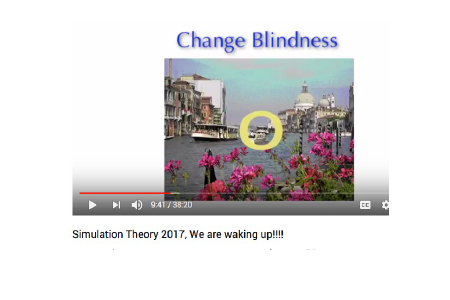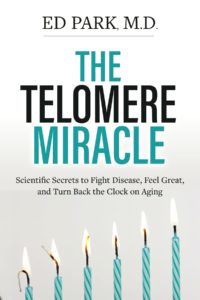
Today, I feel we should discuss a critically important topic: change blindness.
In order to function, we have to maintain a simulation of reality and when we are distracted, emotionally perturbed, or lazy, we do not perceive change.
My book, The Telomere Miracle, will be published January 23, 2018 is available for pre-order. In it, I had fun creating epigraphs for each chapter and the one for chapter 4 (Your mind) reads, “Seeing isn’t believing. It works the other way around”
I frequently get calls and emails from clients, some of whom are in their 70s and 80s, who don’t feel any different. In a way, they might be a little blinded by LACK of change; instead of considering that “normal” should feel like deterioration at age 82, they start to believe that a lack of perceived change might signify lack of efficacy. This is a typical email exchange:
Patient: “So I have been taking Recharge for 6 months now. I am not sure I am feeling any different.”
 Last weekend, I experienced something that was a very different type of show. I had the experience of deja vu because I was seeing a movie that I had previously watched, Beauty and the Beast (by Jean Cocteau, 1946). But I had the experience of jamais vu (unfamiliarity) which was more accurate. The viewing of a movie, scored by Philip Glass and performed live, with the dialogue sung by opera singers, is something that I have never and will likely never see again. Although my mind recognized singing in French, music in a familiar style, and a black and white film, this unfamiliar yet familiar experience was really quite unique.
Last weekend, I experienced something that was a very different type of show. I had the experience of deja vu because I was seeing a movie that I had previously watched, Beauty and the Beast (by Jean Cocteau, 1946). But I had the experience of jamais vu (unfamiliarity) which was more accurate. The viewing of a movie, scored by Philip Glass and performed live, with the dialogue sung by opera singers, is something that I have never and will likely never see again. Although my mind recognized singing in French, music in a familiar style, and a black and white film, this unfamiliar yet familiar experience was really quite unique.
 To more deeply understand the hallucinations of consciousness and change blindness, I recommend watching the lecture by Donald Hoffman below in which he explains how our perceptions are never literally true. He argues that our brains are shrinking. Given the access to Google as knowledge and this image of books that were once prized heirlooms in Danish homes being used as decor, who can argue that the acquisition of knowledge is not being devolved out of us in terms of our fitness?
To more deeply understand the hallucinations of consciousness and change blindness, I recommend watching the lecture by Donald Hoffman below in which he explains how our perceptions are never literally true. He argues that our brains are shrinking. Given the access to Google as knowledge and this image of books that were once prized heirlooms in Danish homes being used as decor, who can argue that the acquisition of knowledge is not being devolved out of us in terms of our fitness?
This is a very interesting video and is filled with fascinating examples of change blindness and how artificial our consciousness really is.
Here are some fun quotes:
“Physical objects are not fundamental. there is no such thing as space-time fundamentally in the actually underlying description of the laws of physics.”
“The whole point of space and time and physical objects is not to show you the truth, it is to hide the truth so that you don’t have to deal with all the complexity.”
“Inter-subjective agreement does not mean objective reality.”
So I ask you: what are the ways in which you are ignoring change and how can you be more aware of it?


3 thoughts on “What is change blindness?”
Interested in buying the new book, especially if it has information that you have not yet published.
DO you need a deposit? I really want to buy the book. I am also writing but on unrelated issues.
Might get to India in mid-winter.
Hi Joan!
Thanks for your interest in the book! You can preorder at Amazon by using this link.
Thank you!